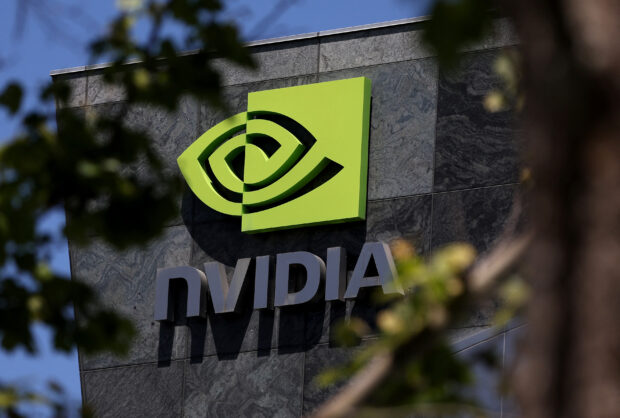
The Nvidia headquarters on May 21, 2024 in Santa Clara, California. The torrid rally in Nvidia and other artificial intelligence-linked equities took a pause June 20, 2024, leaving the tech-centered Nasdaq lower following seven straight records. (Photo by JUSTIN SULLIVAN / GETTY IMAGES NORTH AMERICA / AFP)
NEW YORK, United States — The torrid rally in Nvidia and other artificial intelligence-linked equities took a pause Thursday, leaving the tech-centered Nasdaq lower following seven straight records.
Both the Nasdaq and the S&P 500 retreated from records, while the Dow pushed higher following an up session on European bourses.
“When a handful of stocks are pulling the market higher, what happens when those stocks go down?” asked Steve Sosnick of Interactive Brokers. “It makes things very fragile when they stop.”
But “there is no reason to panic,” Sosnick added.
Market enthusiasm for artificial intelligence has driven a surge in tech stocks, in particular for Nvidia which produces high-end processors prized for AI applications.
Microsoft back on top
Nvidia’s market capitalization edged past Microsoft on Tuesday to become the world’s most valuable publicly traded company. But with Thursday’s 3.5 percent drop, Microsoft was back on top at the end of Thursday’s session.
READ: Nvidia becomes world’s most valuable company on stock market
Initial jobless claims for last week came in slightly higher than expected, while housing starts fell.
“This morning’s economic data was aligned with an economic slowing that could raise questions about the achievability of earnings growth expectations and the Fed’s decision to keep its policy rate higher for longer,” said market analyst Patrick O’Hare of Briefing.com.
Data showing slowing growth gives the Federal Reserve some freedom to ease monetary policy, but so far US central bank officials have indicated they wanted to see more evidence of inflation coming down before committing to an interest cut.
Central banks
Elsewhere, Switzerland’s franc dipped against the dollar after the Swiss National Bank (SNB) announced its second straight interest rate cut, having become in March the first Western central bank to slash borrowing costs that had been raised to battle inflation.
READ: Swiss central bank cuts rate for second straight time
The Bank of England held rates steady as expected ahead of the UK’s July 4 general election, as did Norway’s central bank.
The BoE’s decision to keep its key rate at a 16-year-high came just a day after official data showed UK headline consumer inflation had finally come down to the bank’s two percent target.
READ: Bank of England freezes rate before UK election
But the statement opened the door to a rate cut in August, according to Kathleen Brooks, research director at trading firm XTB, pleasing the stock market but hitting the pound.
“The market has taken today’s news as a step in the direction of a rate cut at the next BoE meeting. The market is now pricing in a 60 percent chance of a rate cut in August, up from a 35 percent chance before the meeting,” she said.
The European Central Bank cut its rate earlier this month, while the US Federal Reserve is expected to introduce only one rate reduction this year.

